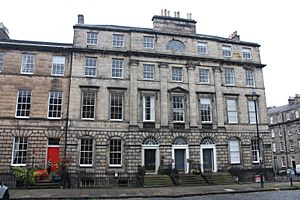Alexander Edington facts for kids
Quick facts for kids
Alexander Edington
|
|
|---|---|
| Born | 1860 |
| Died | 16 July 1928 (aged 67–68) Greytown, Natal
|
Professor Alexander Edington (1860-1928) was a Scottish doctor and scientist. He was a bacteriologist, which means he studied tiny living things like bacteria and viruses. Edington spent much of his life working in South Africa. He is known for his important studies on diseases, including the Spanish flu pandemic of 1918.
Early Life and Education
Alexander Edington was born in Edinburgh, Scotland, in 1860. He went to George Watsons College for his schooling. Later, he studied medicine at Edinburgh University.
In the 1880s, he worked as an assistant surgeon. He also became a professor at the Veterinary College in Edinburgh. There, he taught about diseases in animals. In 1889, he earned a special degree for his work on surgery and how the body works.
Work in South Africa
In 1891, Edington moved to South Africa. He took a job as a "colonial bacteriologist." This meant he studied germs and diseases for the government. One of his first big tasks was to study the Rinderpest pandemic. This was a serious disease that affected cattle and other animals starting in 1890.
Edington tried to find ways to protect animals from Rinderpest. He found that adding a substance called glycerine to animal bile could help make animals immune. While some of his ideas were new and helpful, others were debated. He also studied rabies, a dangerous disease, in the Eastern Cape region.
From 1894, Edington became the main medical officer for the Cape Government. This was a very important role in public health. In 1893, he was chosen to be a member of the Royal Society of Edinburgh. This is a group of respected scientists and thinkers. He also led the first medical meeting in South Africa and edited the South African Medical Journal. In 1900, he earned another special degree for his research on a disease affecting horses in South Africa.
Military Service and Later Years
Alexander Edington also served his country during wartime. He helped create and work in the Ambulance Corps during both the First Boer War and the Second Boer War. These groups helped care for injured soldiers.
During the First World War, he served as a Lieutenant Colonel in the Royal Army Medical Corps. He was in charge of the South Africa Military Hospital. He also worked as a senior medical officer in Dar-es-Salaam.
In the 1920s, Edington was the medical superintendent at Grey's Hospital in Pietermaritzburg. This hospital is now part of Edendale Hospital. After this, he started his own private medical practice in Greytown.
Alexander Edington passed away in Greytown, KwaZulu-Natal on July 16, 1928, at the age of 68.
 | Calvin Brent |
 | Walter T. Bailey |
 | Martha Cassell Thompson |
 | Alberta Jeannette Cassell |


